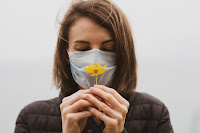307th day in the UoA - Listen to your body and mind
心と体を整える/307th day in the UoA
今回がとうとう今年度最後のメルマガです。皆さん、この1年はいかがでしたか。来年度はコロナの影響が減り、コロナ禍前の会津大学に近い状態になると思われます。来年も在籍する学生さんの多くは入学前だったので、違う大学に来たように感じるかもしれませんね。
>>温点と冷点<<
突然ですが、質問です。
あなたは、「暑さ」に弱いですか、それとも「寒さ」に弱いですか?
今日は、この「暑さ」と「寒さ」のお話をしたいと思います。
人の皮膚には、「暑さ」や「寒さ」を感じる「温点」と「冷点」というセンサーのようなものが備わっています。「温点」は、まばらに配置されているのですが、「冷点」は、全身の皮膚にびっしりと配置されています。例えば、1平方センチメートルに存在する「温点」と「冷点」の数の比較では、鼻の場合は1:8~13となっています。足底の場合には、「温点」がないに等しいのに対し、「冷点」は、3.4となっています。とても冷えた環境にいる時、鼻や足裏が冷たいと感じるのは、「冷点」があるからなのです。
 では、人は「暑さ」を感じないのでしょうか。この質問に対する回答は、皮膚の「温点」がまばらに存在しているため、人は皮膚で「暑さ」を感じにくいということになります。「暑さ」は、脳の視床下部という部位で体温が上がりすぎている時に警告を出します。従って、「暑さ」は皮膚で感知しにくくなっているので、視床下部からの警告が遅れてしまうと、対策がとれなくなってしまいます。一方、「寒さ」は皮膚で感知されるので、即時に対策を講じることができます。
では、人は「暑さ」を感じないのでしょうか。この質問に対する回答は、皮膚の「温点」がまばらに存在しているため、人は皮膚で「暑さ」を感じにくいということになります。「暑さ」は、脳の視床下部という部位で体温が上がりすぎている時に警告を出します。従って、「暑さ」は皮膚で感知しにくくなっているので、視床下部からの警告が遅れてしまうと、対策がとれなくなってしまいます。一方、「寒さ」は皮膚で感知されるので、即時に対策を講じることができます。
会津の冬は、まだ続きます。この寒い冬を乗り越えるために、自分に合った「寒さ」対策を講じましょう。「冷点」が多く配置されている部位を重点的に防寒することで、快適な冬を過ごすことに繋がるかもしれません。 (oki-dokey)
+-+-+-+-+
相談窓口
+-+-+-+-+
会津大学の学生支援について: https://www.u-aizu.ac.jp/campus/support/
◎保健室
nurse@u-aizu.ac.jp
電話番号:0242-37-2517
平日 午前9時-午後4時
◎学生相談室
counseling@u-aizu.ac.jp
電話番号:0242-37-2610
月火金:午前9時-午後4時
木:午後2時-午後4時
◎学生課教務係
sad-aas@u-aizu.ac.jp
0242-37-2600
平日:9時ー17時
■━━━━━━━━━━━━━━━━━□
過去のメルマガはこちら!
http://support-u-aizu.blogspot.com
□━━━━━━━━━━━━━━━━━■
◇~◇~◇~◇~◇~◇~◇~◇~◇~◇~◇~◇~◇~◇~◇~◇~◇
Dear students of the University of Aizu,
This is going to be the last newsletter of this academic year. How was AY2022 for you? We expect the situation will be more like the one before the pandemic, with less impact of COVID-19. Many of you who will still stay on campus don’t know the pre-pandemic days here. So you may feel you are in a different university.
>> Warm spots and cold spots <<
Here is a question for you. Are you sensitive to cold? Or are you sensitive to heat?
Today, I would like to write about the “cold” and the “heat”. Our skin has sensors called "warm spots" and "cold spots" that feel heat and cold. The warm spots are sparsely placed, while the cold spots are distributed more densely all over the body. For example, the ratio of warm and cold spots in 1 square centimeter on the nose is 1:8 to 13. On the other hand, we have almost no warm spots on the sole of the foot, while there are 3.4 cold spots. When we are in a very cold environment, the nose and soles feel cold because of these cold spots.
 Then, don’t we feel heat? The answer is we less likely feel heat from the skin because we don’t have as many warm spots on the skin. We feel hot when the hypothalamus in the brain sends out an alert when the body temperature gets too high. Therefore, when this alert from the hypothalamus is delayed, the body cannot respond to take countermeasures to the heat because we don’t feel heat directly from the skin. On the other hand, because cold is sensed directly by the skin, we can immediately deal with the cold.
Then, don’t we feel heat? The answer is we less likely feel heat from the skin because we don’t have as many warm spots on the skin. We feel hot when the hypothalamus in the brain sends out an alert when the body temperature gets too high. Therefore, when this alert from the hypothalamus is delayed, the body cannot respond to take countermeasures to the heat because we don’t feel heat directly from the skin. On the other hand, because cold is sensed directly by the skin, we can immediately deal with the cold.
The winter will still continue in Aizu. In order to survive the cold winter, please prepare the countermeasures appropriate for you. By protecting the parts of your body that have a lot of cold spots from the cold air, you might be able to spend the winter days comfortably. (oki-dokey)
+-+-+-+-+-+-+-+-+-+-+-+
Consultation services
+-+-+-+-+-+-+-+-+-+-+-+
UoA Student support: https://www.u-aizu.ac.jp/en/campus/support/
◎ Nurse’s room
Email: nurse@u-aizu.ac.jp
Tel:0242-37-2517
Weekdays from 9 am to 4 pm
◎ Counseling Room
Email: counseling@u-aizu.ac.jp
TEL: 0242-37-2610
Mon, Tue, Wed and Fri: 9:00-16:00
Thur:14:00-16:00
◎ Student Affairs
Email: sad-aas@u-aizu.ac.jp
TEL: 0242-37-2600
Weekdays from 9 am to 5 pm
■━━━━━━━━━━━━━━━━━━━━□
This mail magazine has been archived here!
http://support-u-aizu.blogspot.com
□━━━━━━━━━━━━━━━━━━━━■


コメント
コメントを投稿